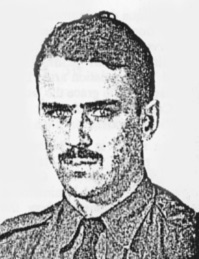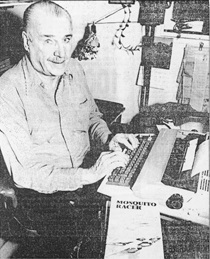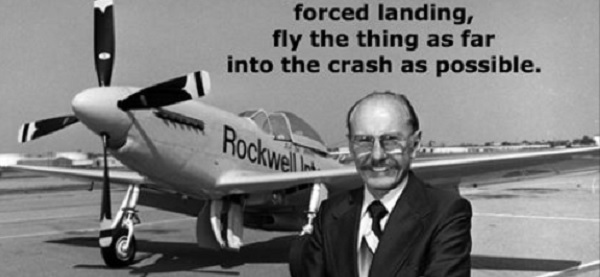|
Donald M. 'Don' Mc Vicar Sainte Anne De Bellevue, QC Canada Dorval, QC Canada QCWA # 15408 Chapter 139 Born: June 21, 1915 |
 |
Don McVicar passed away peacefully January 15, 1997 at his home in Dorval, Qc. Post-deceased by his loving and devoted wife, Loretta, who passed away peacefully in Pointe Claire. Qc. on November 23, 2001, he is survived by son Jimmy, daughter Donna, son Bruce, son Gordon and grandchildren Amanda, Christiana, Brandon, Jamie, Lindsay and Kevin.
Born June 21, 1915 on a farm near Oxbow, Sask. Brought up in Edmonton and educated at St.John's College School in Winnipeg and the University of Alberta. Earned Private Pilot's flying Licence in 1936 with the Edmonton and Northern Alberta Flying Club. First job as VE4PH was as radio operator with the McInnis Fish Co., in the bush giving weather reports for Grant McConnachie's fish flights. Then as radio man with Mackenzie Air Service in Edmonton, and finally as a DOT radio range operator at Cranbrook, B.C.
1940 earned Air Traffic Controller's Licence No#9 and was Officer in Charge of Winnipeg Control Tower. 1941 joined No.2 Air Observer's School in Edmonton as staff pilot and from there moved up to the Royal Air Force Ferry Command as Captain-Navigator. In 1942 was awarded King's Commendation for Arctic flying as described in books titled FERRY COMMAND and FERRY COMMAND PILOT. Next book SOUTH ATLANTIC SAFARI describes delivery of first Martin B-26 'Widow Maker' light bomber over the South and North Atlantic.
In 1943 became flight instructor and flying boat pilot. Carried out first ever Polar Europe-Western Canada flights over the "Crimson Route." In 1944 became an Officer of the Order of the British Empire for "Valuable Services in the Air" as described in NORTH ATLANTIC CAT, published in 1983.
After serving as Chief Pilot for British West Indian Airways returned to Canada in 1945 and formed World-Wide Aviation Consulting which found jobs for many veterans. After the war became VE2WW and flew a Stinson floatplane in a fur trading venture in Labrador as told in A CHANGE OF WINGS.
Expanded to World-Wide Aviation which ferried aircraft from North America to 39 countries around the globe. Also was first and only Canadian participant in Bendix speed dash as told in MOSQUITO RACER published in 1985.
In 1982 wrote first novel THE GRASS RUNWAY which tells of how, in 1980, the combination of high OPEC oil prices, an unscrupulous aircraft broker, a coldhearted bank, and a bitching wife forced two honest pilots into a hazardous drug smuggling flight from Colombia S.A. to the U.S.A.
1983 Named Canadian "Man of the Year" by Silver Wings, a prestigious international fraternal aviation society.
MORE THAN A PILOT, published in 1986 tells of the struggles of his pioneering aviation company, World-Wide Airways Inc. Also gives fascinating accounts of flights accomplished by aviation giants of yesteryear.
A RAILROAD FROM THE AIR, published in 1989, covers the period 1949-54 when the Quebec North Shore and Labrador Railroad was being built, aided by a massive airlift. Interweaves McVicar's personal story and that of his company with that of Hollinger Ungava Transport.
1992 saw DISTANT EARLY WARNING published with numerous charts and photographs. Tells, for the first time, how urgently-needed radar lines were built in spite of the grim weather conditions of the Canadian Arctic. World-Wide Airways was a major air carrier, using several types of aircraft including amphibious PBY Cansos on these essential projects.
1994 published THROUGH CUBA TO OBLIVION, which recounts how my company World-Wide Airways used Curtiss C-46, Douglas DC4 and Lockheed Constellation aircraft to fly chicks, livestock and food to Cuba when the Americans cut that country off. Covers the sad story when Castro defaulted on the flight agreement, which almost destroyed World-Wide. Then tells of how the company began numerous transatlantic passenger charter flights during 1964/65 using Lockheed Super-Constellations with great success. And, finally, in 1965, how the Canadian Government's Air Transport Board effectively regulated World-Wide out of business.


